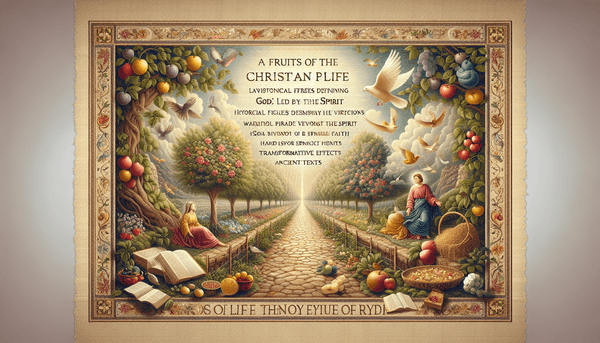True Apostleship vs. Deceptive Counterfeits
Paul's ministry was marked by trials and sufferings, which he recounts as evidence of his genuine apostolic authority. He contrasts these hardships with the deceptive motives of false apostles who boasted and sought to lead the Corinthians astray. Paul warns the believers not to be fooled by those who disguise themselves as servants of righteousness, comparing them to Satan, who masquerades as an angel of light (2 Corinthians 11:13-15). This stark contrast serves as a cautionary reminder to the faithful to discern the spirits and uphold the integrity of the apostolic message, one that Paul delivered not with eloquent speech but with a demonstration of the Spirit's power (1 Corinthians 2:1-5).
Blended Families through a Biblical Lens
The concept of blended families, while not labeled as such in the Bible, is nonetheless present within its narratives. The patriarch Jacob's family is a quintessential example, where children from different wives and concubines coexisted, leading to a complex web of relationships marked by love, jealousy, and eventual reconciliation. New Testament teachings from Jesus and the apostles further underscore the importance of love, kindness, and mutual respect within all familial relationships (Ephesians 5:25-33; Colossians 3:18-21). These passages offer timeless wisdom for modern blended families, encouraging them to foster an environment of understanding and to demonstrate the fruits of the Spirit in their interactions. For more insights on biblical teachings, consider reading about the spiritual lessons from Jonah to the cross, which highlight the virtues of obedience, humility, and sacrifice (Galatians 5:22-23).
The Meaning of the Eucharist in Non-Denominational Worship
In non-denominational Christian settings, the Eucharist holds a place of reverence as a symbolic act of worship and remembrance of Jesus' Last Supper and sacrificial death. The practice, derived from Jesus' instruction to His disciples, serves as a reminder of the Lord's passion and the hope of resurrection (Luke 22:19-20; 1 Corinthians 11:23-26). It also represents the unity among believers, as they partake in one bread, signifying one body in Christ (1 Corinthians 10:16-17). While the frequency and form may differ from traditional liturgical practices, the essence of the Eucharist as a communal and spiritual encounter with Christ remains central to the worship experience.
Conclusion
As we've journeyed through Paul's letters and biblical accounts, we've encountered the steadfast concern for the Church's faithfulness, the intricate dynamics of family life, and the profound significance of Christian rites within worship. These themes, while ancient in their origins, continue to speak into the experiences of contemporary believers, offering guidance, comfort, and a call to authenticity in our spiritual and relational lives. In revisiting these scriptural lessons, we are reminded of the enduring power of God's Word to address the most pressing questions and challenges of every generation. For a deeper understanding of the universal nature of God’s kingdom and the diversity of spiritual gifts, consider exploring our related discussion on the inclusivity of salvation and spiritual gifts.
FAQ
Q: What does Paul mean when he expresses 'godly jealousy' for the Corinthians?
A: Paul's use of 'godly jealousy' refers to his deep concern for the spiritual fidelity of the Corinthians, fearing they might be led astray from their pure and simple devotion to Christ, similar to how Eve was deceived (2 Corinthians 11:2-3).
Q: Why does Paul discuss his sufferings in 2 Corinthians 11?
A: Paul recounts his sufferings to validate his apostolic authority and to contrast his genuine care for the Corinthians with the motives of false apostles who were misleading them (2 Corinthians 11:23-29).
Q: How does the Bible address the complexities of blended families?
A: The Bible provides narratives, such as the story of Jacob's family, that reflect the complexities of blended family relationships, while New Testament teachings offer principles of love and mutual respect that apply within all family dynamics (Genesis 37:3-4; Ephesians 5:25-33).
Q: What is the significance of the Eucharist in non-denominational churches?
A: The Eucharist in non-denominational churches is a commemorative act honoring Jesus' last supper and sacrifice, emphasizing the unity of believers and their participation in the body of Christ (1 Corinthians 11:23-26).






